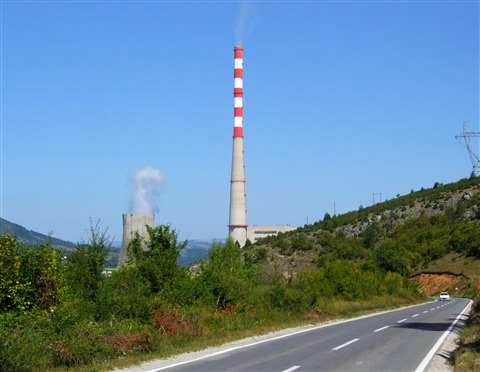Montenegro signs up to €700 million carbon reduction project
11 April 2023
Private equity firm Chayton Capital has signed a Memorandum of Understanding (MoU) with the government of Montenegro, for the development of carbon reduction facilities in the country.
 Pljevlja Power Station in Montenegro. Photo: Pudelek (Marcin Szala)
Pljevlja Power Station in Montenegro. Photo: Pudelek (Marcin Szala)
The MoU relates to an infrastructure development plan valued at approximately €700 million and including the modernisation of a thermal power plant in the town of Pljevlja, shifting its power source away from coal and onto biomass and waste materials, such as fly ash, gypsum, marl and waste wood.
The scope of the MoU also covers the construction of a connected cement production plant and a plant dedicated to the manufacture of cement bonded particle boards for modular construction, based on circular economy principles and utilising by-products from the power plant.
Further plans for the development of the area include the construction of a waste recycling plant and an educational facility, for the study of mining and geology.
Following the signing of the MoU, Chayton Capital said it will undertake a comprehensive feasibility study, supported by consortia of regional experts and industry specialists, ensuring both the financial feasibility of the project, and the sound footing of its technical and technological design.
The project will be developed by Chayton Capital, in partnership with the Montenegrin government and the state-owned power company EPCG.
Significant environmental shift
 From the left: Montenegro PM Dr Dritan Abazović; CEO of EPCG, Nikola Rovčanin; and founding partner of Chayton Capital, David Allen, at the MoU signing. Photo: Montengrin Government
From the left: Montenegro PM Dr Dritan Abazović; CEO of EPCG, Nikola Rovčanin; and founding partner of Chayton Capital, David Allen, at the MoU signing. Photo: Montengrin Government
In a statement, following the joint MoU signing, the partners said the project would directly create over 600 new jobs in the Pljevlja region.
David Allen, founding partner of Chayton Capital, highlighted the significance of the project to Montenegro, saying it could completely negate the need for the €100 million in cement that the country currently imports each year for construction work.
He added that the project would need to proceed sensitively, given that the Pljevlja plant is currently responsible for up to 40% of the Montenegro’s domestic electricity requirements.
EPCG’s CEO, Nikola Rovčanin said the project was a “historical platform for the development of the north, specifically Pljevlja,” and announced that €100 million had already been activated, of which €70 million would be directed towards ecological reconstruction.
Montengro’s Prime Minister, Dr Dritan Abazović, said, “Our goal is to meet environmental standards and to create conditions for the implementation of numerous projects for which there are conditions after the preparation of the study. I remain a great optimist that Montenegro is really close to a new investment momentum especially in the north of the country, where Pljevlja has a significant place.”
David Allen said the project will “boost energy production with a focus on environmental protection, create new jobs and improve the socio-economic environment for this and future generations, all while respecting the laws of Montenegro and the EU.”
STAY CONNECTED



Receive the information you need when you need it through our world-leading magazines, newsletters and daily briefings.
CONNECT WITH THE TEAM








